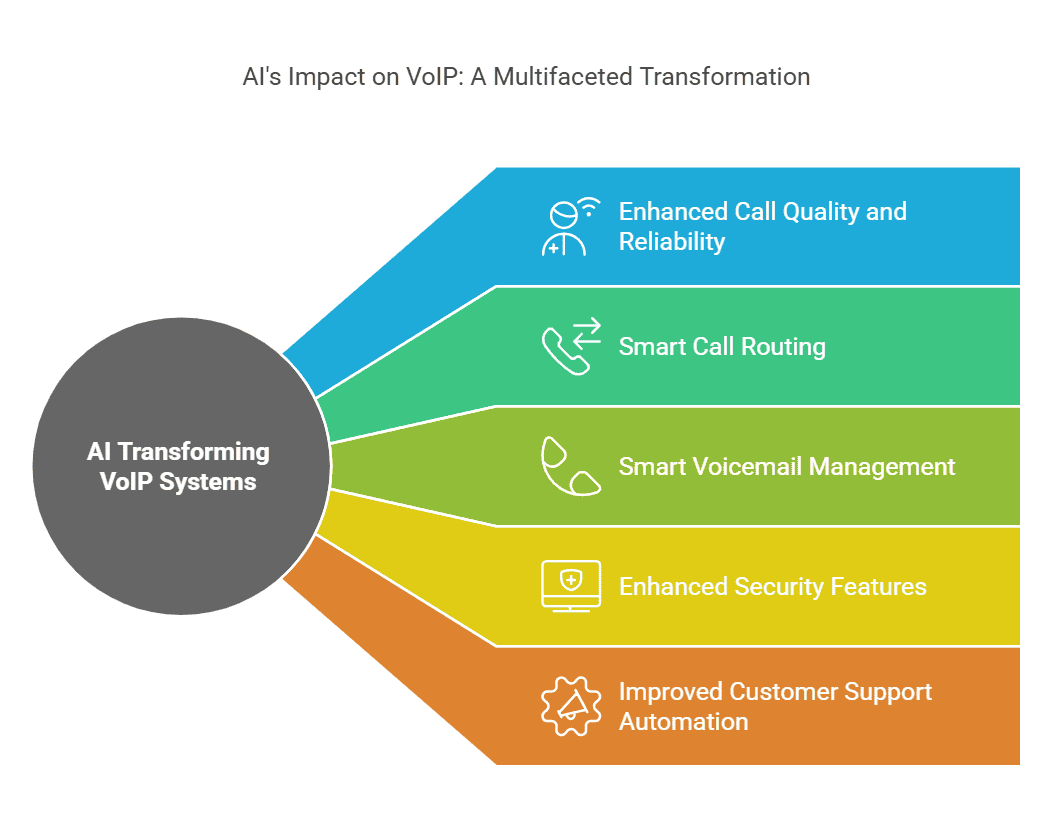Voice over Internet Protocol (VoIP) technology has transformed communication, offering a cost-effective and flexible alternative to traditional telephone systems. VoIP has become vital for businesses and individuals, permitting voice calls to be made online. As the demand for effortless communication continues to grow, so does the need for enhanced features and capabilities. This is where Artificial Intelligence (AI) comes into play, converting VoIP systems in previously unimaginable ways.
AI technologies are being integrated into VoIP systems to improve call quality, enhance security, and provide automation that facilitates communication. Using machine learning algorithms and natural language processing, AI is assisting organizations in optimizing their communication strategies, reducing operational costs, and delivering superior customer experiences.
Let us explore five ways AI transforms VoIP systems: enhancing call quality and reliability, intelligent call routing, smart voicemail management, enhanced security features, and improved customer support automation.
1. Enhanced Call Quality and Reliability
One of the most significant challenges faced by VoIP systems is maintaining high call quality and reliability, particularly in environments with fluctuating internet connectivity. AI technologies are addressing these challenges through several innovative solutions.
AI-Driven Noise Reduction
Background noise can detract from the quality of voice calls. AI algorithms can analyze real-time audio signals to find and filter out unwanted background noise. By employing adaptive filtering and machine learning-based noise suppression techniques, these algorithms ensure that only the speaker’s voice is transmitted clearly. This enhancement is beneficial in open office environments or public spaces where distractions are common.
Adaptive Bandwidth Management
AI also plays a crucial role in optimizing bandwidth usage during calls. By continuously monitoring network conditions and adjusting call parameters accordingly, AI can ensure that voice data is transmitted efficiently without compromising quality. For instance, if network congestion is detected, AI can dynamically adjust audio codecs or reduce the bitrate to maintain call clarity. This adaptability helps prevent dropped calls and ensures a smoother communication experience.
Real-Time Quality Monitoring
AI tools can analyze latency, jitter, and packet loss during calls. If issues arise, the system can automatically alert IT personnel or adjust to mitigate problems before they impact the user experience. This proactive approach to quality management assists organizations in maintaining high communication standards.
2. Smart Call Routing
Efficient call routing is vital for providing excellent customer service and ensuring that inquiries are handled promptly by the right agents. AI enhances this process through intelligent call routing mechanisms.
Automated Call Distribution
AI-driven automated call distribution systems analyze caller data—such as location, previous interactions, and preferences—to route calls to the most appropriate agents. This confirms that customers are connected with representatives with relevant expertise or familiarity with their requirements. As a result, wait times are reduced, and customer satisfaction improves.
Predictive Analytics
By utilizing historical data and predictive analytics, AI can anticipate customer needs based on patterns observed in past interactions. For instance, if a customer frequently contacts support regarding a specific issue, AI can prioritize their calls or route them directly to an agent in that area. This personalization level improves the overall customer experience and builds loyalty.
Personalized Customer Experiences
AI’s ability to recognize returning customers permits more personalized interactions. When a known customer calls in, the system can instantly retrieve their previous interaction history and preferences. This information enables agents to provide tailored solutions quickly without requiring customers to repeat themselves, creating a more efficient and satisfying communication process.
3. Smart Voicemail Management
Voicemail management has traditionally been cumbersome for many organizations; AI innovations are making this process more efficient.
AI-Driven Voicemail Transcription
AI-powered voicemail transcription services automatically convert voicemails into text format. This allows users to read messages at their convenience rather than listening to them one by one. Transcriptions can also be easily searched or categorized based on urgency or topic, significantly simplifying message management.
Prioritization of Voicemails
AI can analyze voicemail content to determine urgency levels based on keywords or phrases used within messages. For instance, a voicemail containing phrases like “urgent” or “time-sensitive” can be flagged for immediate attention, while less critical messages are sorted accordingly. This prioritization confirms that important communications are not overlooked amidst a busy inbox.
Integration with Communication Platforms
Modern VoIP systems often integrate with various communication platforms. AI enhances this integration by permitting users faultless access to their voicemails across devices—whether on their smartphones or desktop computers—ensuring they never miss important messages no matter where they are.
4. Enhanced Security Features
As cyber threats evolve, confirming secure communications has become paramount for organizations utilizing VoIP systems. AI offers several advanced security features that assist in safeguarding sensitive information.
Fraud Detection Algorithms
AI algorithms can find unusual patterns in call data that may indicate fraudulent activities, such as toll fraud or phishing attempts. By continuously monitoring call behaviour—such as unusual calling patterns or spikes in international calls—AI can alert administrators to potential threats before they escalate into serious breaches.
Real-Time Threat Monitoring
With real-time threat monitoring capabilities powered by AI technology, organizations can detect security threats as they arise rather than after damage has been done. Continuous analysis of incoming and outgoing calls allows immediate action against suspicious activities—such as blocking certain numbers or alerting IT teams for further investigation.
Data Encryption Enhancements
Data encryption is critical for securing voice communications over the internet; traditional encryption methods may not always keep pace with emerging threats. AI contributes to more potent encryption methods by analyzing vulnerabilities within existing protocols and suggesting improvements based on current threat landscapes, ensuring that communications remain secure against unauthorized access.
5. Improved Customer Support Automation
Timely customer support is vital for maintaining competitive advantage. AI technologies are transforming how organizations manage customer interactions through automation.
AI-Powered Chatbots
Chatbots powered by AI can handle customer inquiries around the clock without human intervention—a significant advantage for businesses looking to provide 24/7 support services. These chatbots utilize natural language processing capabilities to understand user queries accurately while providing relevant responses based on pre-programmed knowledge bases.
24/7 Availability
The ability of AI systems to operate continuously means customers receive assistance whenever they need it—regardless of time zones or business hours. This increases satisfaction among consumers who appreciate prompt responses outside regular office hours.
Seamless Integration with VoIP Systems
AI tools that enhance customer support often integrate with existing VoIP platforms. This permits agents easy access to caller information during interactions while enabling smooth transitions between automated chatbot responses and live conversations when necessary.
Conclusion
Integrating Artificial Intelligence into Voice over Internet Protocol (VoIP) systems marks a significant evolution in how organizations communicate internally among employees and externally with clients/customers alike! From enhancing call quality through adaptive management techniques to improved security measures against cyber threats, AI has proven invaluable across numerous facets within modern telecommunication frameworks today! As we’ve explored throughout this blog post—from intelligent routing processes designed specifically around user preferences to smart voicemail management solutions—there’s no denying that adopting these advancements will ultimately lead businesses toward greater efficiency while improving overall customer satisfaction levels! We at Intratel offer superior VoIP Systems at the best prices. Call us now! – 1-866-409-8647

